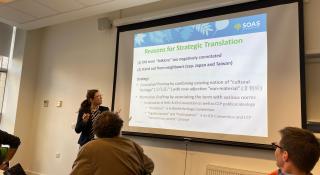Breadcrumbs navigation
Worldmaking after Empire: The Rise and Fall of Self-Determination - a summary
Author Adom Getachew provides a summary of her book Worldmaking after Empire: The Rise & Fall of Self-Determination (Princeton University Press, 2019). This is part of a book symposium from the Africa and International Studies Working Group.
Worldmaking after Empire: The Rise and Fall of Self-Determination reconstructs the animating questions, debates, and institutional visions of decolonization in the Black Atlantic. Decolonization is often perceived as a transition point from a world of empires to the world of nations we now inhabit. It is the moment most deeply associated with the universalization of national sovereignty as the norm of global politics. Worldmaking after Empire revises this standard narrative to argue that anticolonial visions of self-determination exceeded the national frame and were, first and foremost, projects of remaking the international order. I argue for reading the political thought of Black Atlantic intellectuals and statesmen such as Nnamdi Azikiwe, W.E. B. Du Bois, George Padmore, Kwame Nkrumah, Eric Williams, Michael Manley, and Julius Nyerere for the worldmaking aspirations and projects that they viewed as necessary to securing independence after empire. Central to their internationalism was an account of empire as a global and globalizing project that produced a racialized international hierarchy. Anticolonial nationalists understood colonial rule as a symptom of this broader problem of unequal integration, which made possible the legal, political, and economic domination of non-European peoples. It was in response to this problem of international hierarchy that nationalists articulated alternative projects of worldmaking that ranged from the introduction of a right to self-determination at the United Nations, the constitution of regional federations in Africa and the Caribbean, and the creation of a New International Economic Order. Together these projects sought to transcend the legal, political, and economic dimensions of hierarchy and establish the principle of nondomination as a foundation for a post-imperial world order.
Three conceptual and theoretical interventions emerge from this reconsideration of decolonization. First, Worldmaking after Empire revises the relationship between sovereignty and empire. Rather than a straightforward counterpoint to empire, I show how racialized forms of sovereignty worked to exacerbate domination in the absence of alien rule. Tracing the history of Ethiopian and Liberian sovereignty in the League of Nations, I demonstrate how instances of inclusion engendered forms of racialized and burdened membership that render black sovereignty a contradiction in terms. Less a bilateral relationship between metropole and colony structured by the colony’s exclusion from international society, empire appears here as international mechanisms of unequal integration that facilitate political and economic domination. This account of empire illuminates its persistence even after the collapse of formal empires in the age of decolonization.
Second, by recovering the critique of international racial hierarchy that animated black anticolonial nationalists and the visions of world order they articulated in response, I highlight the distinctive character of postcolonial state formation. Rather than view the postcolonial state as derivative of a Euro-American model, I show that its emergence from the processes of unequal imperial integration created distinctive burdens that shaped the conditions for self-government in the colonized world. From this perspective, the crises and failures of the postcolonial state emerged not from internal deficiencies but instead from the interactive character of domestic politics and international relations. In the combination of nationalism and internationalism—of nation-building and worldmaking—anticolonial nationalists presciently recognized the ways that democratic self-rule at home depended on and required international institutions that created conditions of equality and nondomination. While the dependent character of postcolonial state formation was distinctive, this experience highlights the broader conditions of the modern nation-state in the age of globalization. I argue that anticolonial worldmaking offers in this context an alternative to the persistent but facile opposition between nationalism and internationalism.
Finally, I deploy this historically informed and postcolonial approach to international order to reorient contemporary normative debates within cosmopolitan political theory. Worldmaking after Empire charts the contours of a postcolonial cosmopolitanism that centers the persistence of imperial hierarchy and thus supplements the cosmopolitan emphasis on the moral dignity of persons with attention to collective claims of independence and nondomination. Contemporary debates about global justice, regionalism and the role of international institutions have historical analogues in anticolonial worldmaking that have yet to be mined for their critical and normative implications.


